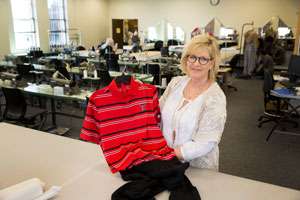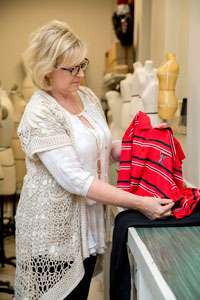Researchers create clothing to address Alzheimer's patients' needs

From memory loss and impaired physical abilities to medical costs, Alzheimer's disease creates many hardships for both the people suffering from it and the people trying to care for them. But a collaborative project through Texas Tech University is working to solve at least one of those problems.
Su-Jeong Hwang Shin (Su Shin), an associate professor and the program director of Apparel Design and Manufacturing in the Department of Design and the College of Human Sciences, has been working since 2015 on a research project to design clothing that specifically addresses the needs of Alzheimer's patients.
"It's not just making clothing; we need to understand the needs of the individuals with Alzheimer's from their view," Shin said. "There are so many issues with unknown factors of Alzheimer's disease that we have not discovered yet. It was necessary for us to research the characteristics related to Alzheimer's disease and patients' dressing issues. We tried to understand the views from caregivers and caretakers."
Working with David Hancock, a postdoctoral researcher in the Department of Psychological Sciences, and Julie Chang, an assistant professor in Hospitality and Retail Management, Shin researched what it would really require to create clothing for Alzheimer's patients. One of Shin's apparel design students, Leisha Womble, became particularly interested in the project because of her father-in-law's battle with the disease.
"Having someone with Alzheimer's disease in our family brought me to a place where I was able to see there was a large gap in clothing design for individuals in that situation," Womble said. "They have special needs that are very specific to this disease.
"There comes a time when they begin to want to disrobe because they're uncomfortable in the outfit they're wearing. That's a problem for caregivers, not only in the home but also in an institutional setting. They need a garment that is difficult to remove but that is comfortable and easy for caregivers to remove and wash, and also that makes them feel good about themselves and makes the family feel good about them when they come to visit."
Working together, Shin and Womble created a prototype garment. They started with a collared sportswear-type shirt for a more professional appearance, but sewed shut a button-up area in the front. They then sewed the shirt to a pair of black sweat pants made from a heavy cotton fabric, sewing closed the pockets and the fly. They added a soft Velcro product inside the pant legs to allow them to stretch over shoes and be shortened as needed. Then they added a 24-inch zipper along the back of the garment to make it easier for caregivers to dress and undress a patient. And for the patient's comfort, they added a Velcro flap over the top of the zipper.
The garment is not the first of its kind, but the first that combines all these elements.
"There are some garments on the market that have some of these facets, but we feel like we can come up with a better garment," Womble said. "If we continue in the research, we can come up with a lot better fabrics, a lot better drape, a lot better silhouette and comfort for the wearer."
The research is continuing. Thanks to a recent $12,500 grant from the College of Human Sciences Research Office, Shin's group will soon purchase samples of commercially available adaptive clothing that Alzheimer's patients and caregivers will use through July.

"After feedback and evaluation of adaptive clothing, for the future, we want to develop effective adaptive/therapeutic clothing for the individuals with Alzheimer's, understanding the needs from the individuals with Alzheimer's and caregivers' view," Shin said.
One of the problems with other garments currently on the market is the price. At around $100 per outfit, the cost may be prohibitive for many families.
"When somebody is in care, you have medications and doctors' appointments, and a garment is just an added expense," Womble explained. "We'd like to find something that's not only economical but is something that they would feel proud to have their loved one wear.
"I noticed when I would take my children to visit their grandfather, they were somewhat disturbed by the fact that most of the people who lived there seemed to wear pajama-type clothing. They didn't understand why it was the middle of the day and everyone seemed to have their pajamas on. That was one of the first things I thought. It was very important that they have dignity – not only for themselves but also for the family and for the caregivers."
Womble's impression has been backed up by research.

"I found a really good study that found people in institutional settings, not only did they react differently when they were dressed appropriately for the day, but everyone who dealt with them behaved more appropriately," she said. "If they were more dressed for success, caregivers tended to treat them with more dignity than if they were in pajamas or a robe."
That research led to another question Shin hopes to answer about the quality of care Alzheimer's patients receive as a result of their clothing.
"We see the clothing as an important media," Shin said. "How we dress or how we present in a certain situation, it provides different impressions in society. For example, someone who is going for an interview wants to have a nice dress because it creates a good impression. So we thought, if individuals have a better dress, couldn't they get better treatment or better attention from other people? That is a more likely psychological aspect we're looking at."
Womble said she's proud and honored to have been involved in such important work.
"I love to sew and I've spent years making things for myself and my kids," she said, "but this is something that really brings me joy, to be able to use the skills and the knowledge I've learned here at Texas Tech to do something that makes life better for someone who can't do it for themselves."

















